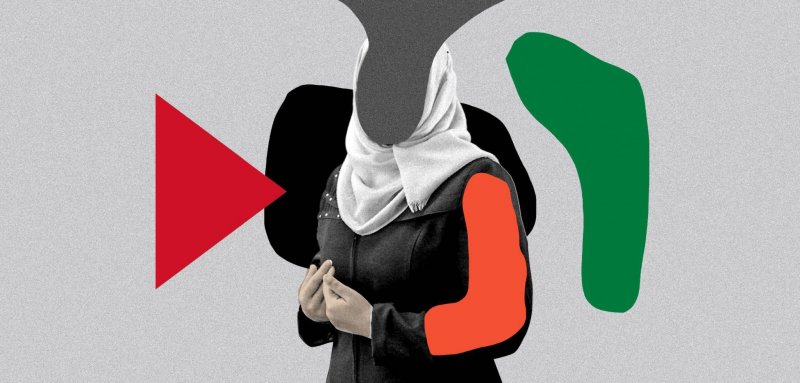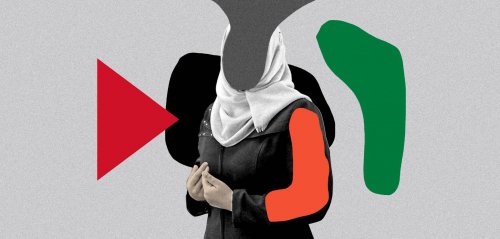The new school year has begun with controversy after a number of teachers in public schools in the Gaza Strip pushed a certain conservative dress code that girls under 17 were forced to adhere to despite contravening current law.
On her first day in the new school year, 15-year-old student Rana Sameh woke up early, eager to embark on a new learning experience and make new friends. She braided her hair, packed her bag and put on her school uniform and set off.
Imposing an Islamic Dress Code
Rana recounted to Raseef22 what happened to her on the first day of school, "It was the first day of school and I was delighted to see all my friends. We gathered to discuss a study plan for this important stage, we sat together for a while then we went up to class. I was alarmed and surprised when the teacher pointed at me and told me to go immediately to the headmistress’s office.
Rana continues “My head was spinning with thoughts, I was still a new student what could I have possibly done? I obeyed my teacher and knocked on the door of the headmistress's office. She asked me to enter but not to sit, then told me that I was in violation of the school uniform, which all students had to abide by. And using her words carefully, she informed me that being in school without a headscarf or abaya may result in me being denied from completing my education as I was not complying with the Islamic dress code and that I was not allowed to object in order to avoid being humiliated by teachers who emphasized the necessity of “wearing a uniform suitable for a school environment” and that “school is not a catwalk”.
The next day, the student brought along her mother, who criticized the behaviour of the headmistress at Fahd Al-Ahmad Al-Sabah School in the Al-Tuffah neighbourhood in Eastern Gaza. The conversation between Rana’s mother and the headmistress was heated, but it did not go beyond a verbal skirmish and ended with the headmistress presenting two alternatives to the mother and daughter. Either that she complied with the dress code of the school and wore a white headscarf and an abaya or go to another school. Rana had no choice but to comply with the headmistress’s order, which she described as “harsh” and did not respect her personal freedom. She refused to move schools and leave her friends even though she believed this decision had a negative impact on her.
The public school uniform in Gaza was formerly composed of a skirt and a denim shirt but the public schools under the Hamas government have come up with a new uniform which is comprised of black or navy abayas and plain colored shoes and a headscarf, This dress code was posted on the gates of schools and on social media before the beginning of the school year.
An Assault on Freedoms and the Law
In another similar story, Palestinian activist Nariman Hawhi posted a tweet describing what happened to her sister, who began to study this year in Beit Hanoun School in the Northern Gaza Strip and was forced to wear an Abaya rather than the denim ensemble by the headmistress.
She told Raseef 22 that her sister, Razan is resistant to being sexualized in this way as she is under 15 years old. She demanded that the freedom of education be respected not to exclude girls, and to impose uniforms on them that are not legally prescribed by the Palestinian higher education authority.
The teacher sent me to the head mistress’ office. She carefully informed me that being in school without a headscarf and abaya could result in a ban from completing my education as I was not complying with the Islamic dress code. This is not a catwalk she said.
The Hamas government came up with a new uniform for girls: black or navy abayas, plain coloured shoes and a headscarf. This dress code was posted on the gates of schools and on social media before the beginning of this school year.
Nariman's tweet sparked several responses and there were those who supported the headmistress and those who were against her.
The director of the Women's Affairs Technical Committee (and renown feminist activist, Nadia Abu Nahla told Raseef22 that she considered the imposing of an "Islamic dress code" on the young students an infringement on their rights and freedoms. Especially since there is no legal clause permitting this. It is just part of a pattern of thinking and ideology practised by the Hamas administration.
Hijab is a Sensitive Issue
On the other hand, Safa al-Astal who has been a teacher and supervisor at the Eilabun school in the southeast of the Gaza Strip for the past ten years defended the practice of imposing a "lslamic dress code " on Gaza students telling Raseef22 that It is social customs not the law which requires that a young girl going to preparatory and secondary school wear white headscarves and a abaya and that when she was young her mother would take her to buy the items before the beginning of the school year.
Safa justifies these practices as happening because wearing Hijab is a sensitive issue in Palestinian society, so teachers in schools advise girls to wear the hijab along with a abaya as official "Muslim " attire, especially at the secondary level.
Forcing high school students to wear headscarves and robes is justified by Safaa as being socially responsible to do so as it would ensure good behaviour from them and would protect them from being harassed. School administrations do not accept girls coming to school in clothes that do not comply with certain standards like for example coming to school with clothes that are too tight. She believes that these limits on dress have been “ordered for girls by Islam”.
According to this teacher, the majority of girls in schools in the eastern and southern areas of the Gaza Strip wear the hijab and Islamic uniforms voluntarily so that they don’t feel that they are ostracized by society.
Safa 's opinion reflects that of a number of educators in Gaza, who identify strongly with the slogans of Hamas, which runs the Gaza Strip. Every year there is controversy regarding the issue of school uniforms for female students but the Ministry of education has not issued a decree that clarifies its position on the matter
"There are certain criteria for Palestinian school uniforms," said Mohammed Seyam, director-general of higher education in Gaza. "Students should dress in a way that does not go against the customs and traditions of Palestinian society."
Threats, Intimidation and Exclusion
Seyam refused to consider what some high school principals violate freedoms and believes that every headmistress has the right to run her school as she sees fit in accordance with social norms and standards set by the ministry, in order to protect the interests of students not to be controlling or restrictive.
He added that if problems arise between a headmistress and students regarding this issue then the two parties are subject to investigation by the Ministry of Education, mostly regarding individual behaviour,
But Nadia believes that in some schools, teachers use intimidation and threatened to deny education to girls who refuse to obey their decisions, and sometimes they are singled out and humiliated in front of their classmates.
She stressed that such negative practices may have serious consequences for the student's personality, especially those who have only recently started high school and may have a negative effect on their psyche, their educational performance and may cause them to leave school or be bullied.
The activist stressed the need to give the students a measure of personal freedom as long as they do not infringe on the rights of others and this has been granted to them by law and that they should not be pressured by their teachers or headmistresses at school.
Raseef22 is a not for profit entity. Our focus is on quality journalism. Every contribution to the NasRaseef membership goes directly towards journalism production. We stand independent, not accepting corporate sponsorships, sponsored content or political funding.
Support our mission to keep Raseef22 available to all readers by clicking here!






Join the Conversation
Anonymous user -
1 hour agoتعليقا على ماذكره بالمنشور فإن لدولة الإمارات وأذكر منها دبي بالتحديد لديها منظومة أحترام كبار...
Anonymous user -
2 days agoUn message privé pour l'écrivain svp débloquer moi sur Facebook
Anonymous user -
2 days agoالبرتغال تغلق باب الهجرة قريبا جدااا
Jong Lona -
3 days agoأغلبهم ياخذون سوريا لان العراقيات عندهم عشيرة حتى لو ضربها أو عنقها تقدر تروح على أهلها واهلها...
ghdr brhm -
3 days ago❤️❤️
جيسيكا ملو فالنتاين -
5 days agoجميل جدا أن تقدر كل المشاعر لأنها جميعا مهمة. شكرا على هذا المقال المشبع بالعواطف. احببت جدا خط...